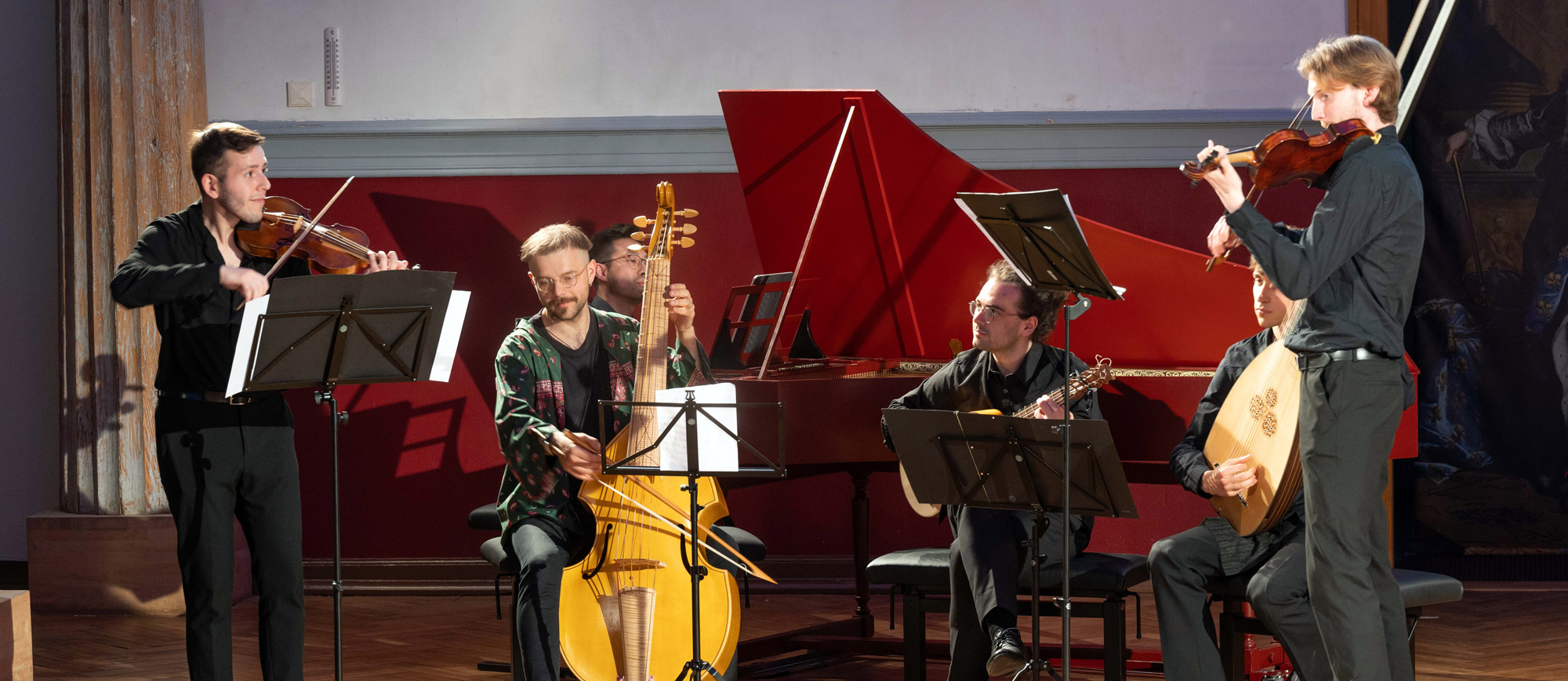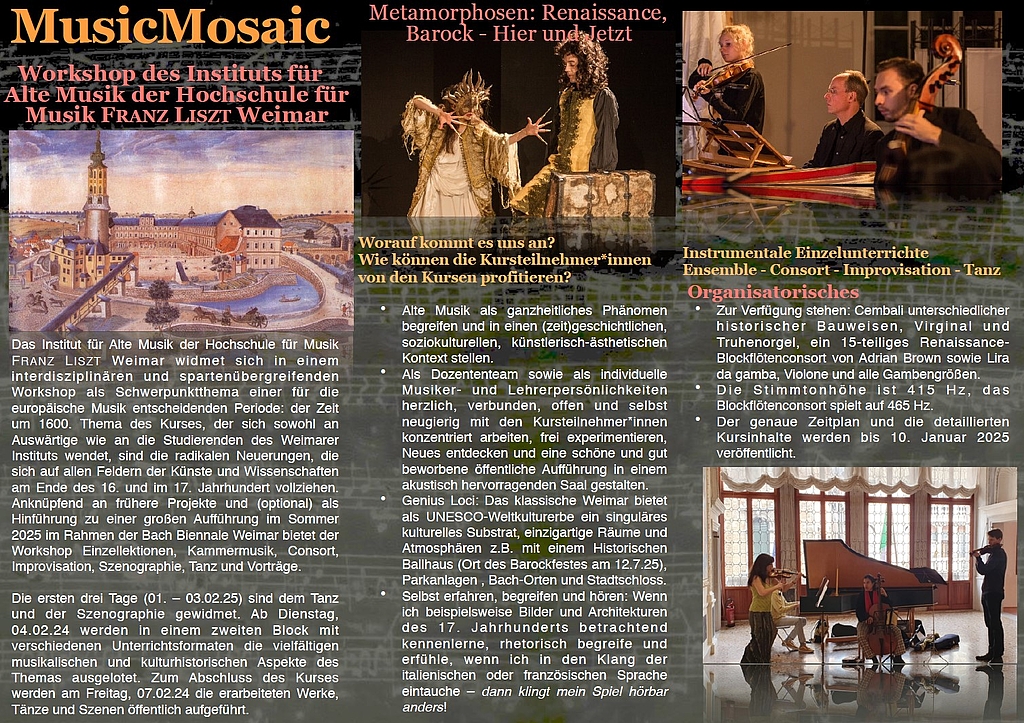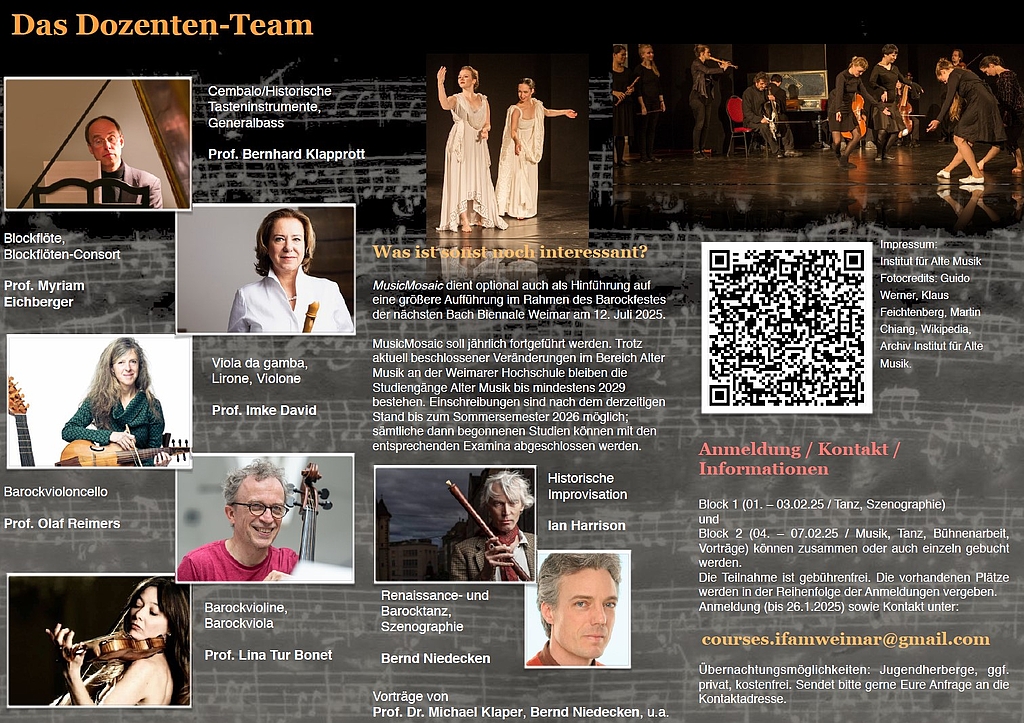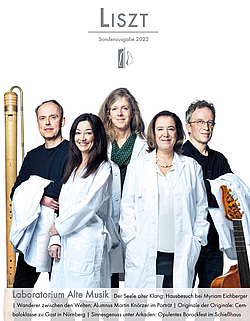Department of Early Music
Weimar is situated in the middle of a region that already in the 17th and 18th centuries represented a "center" of European musical culture. The life and works of Weimar Court Organist and Concertmaster Johann Sebastian Bach are closely linked to the achievements of numerous other composers active in this region. The "1999 European Capital of Culture" has become famous throughout the world also for its resident poets, such as Goethe, Schiller, and Wieland, who likewise influenced the musical language of their time.
This musically and historically inspiring environment, in combination with a high density of authentic historical performance venues and lively cultural tourism, ensures an attractive sphere of action for the regular concerts and semester projects based at the Department of Early Music. The Department of Early Music's concert and event series "Der GranatApfel" (The Pomegranate) reflects the work of the department and, alongside its presence in Weimar and Thüringen, also includes concerts in cooperation with cultural partners from throughout Germany and abroad.
As part of the Bachelor of Music (8 sem.) and Master of Music (2 or 4 sem.) degrees and the postgraduate Concert exam (4 sem.) the following courses are offered:
Recorder, Viola da gamba, Lirone, Violone, Baroque Violin, Baroque Viola, Baroque Violoncello, Bass violin, Harpsichord, Clavichord, Early Fortepiano, Organ (Early Music), Early Music Ensemble, Chamber music (open classes), Consort, Historical improvisation, Historical dance, Basso continuo sources and practice, tuning early keyboard instruments, Source studies, Historical organology, Performance practice, Historical music theory, History of notation, Voice, Repetition, etc.
Semester projects with public performances on specific topics within the area of Early Music, as well as complementary courses and workshops with guest teachers, enrich the studies in the Department of Early Music. Additionally, Germany's largest Department of Musicology (Weimar-Jena) offers the students a comprehensive selection of interesting courses and insightful seminars on topics relating to Early Music and performance practice.
The choice of several flexible options allows students to put together their own specialisation within the Bachelor's and Master's programmes of the Department of Early Music.
The Master of Music (2 sem. / 60 CP) and the postgraduate Concert exam (4 sem.) concentrate primarily on the student's major instrument.
In the Master of Music "Early Keyboard Instruments" as well as "Early String Instruments" (4 sem. / 120 CP), the major subject can be made up of several related instruments studied simultaneously.
In the Master of Music with profile (4 sem. / 120 CP), profile development can be selected in individual areas such as Early Music (specific curriculum), Basso continuo / ensemble, Consort/ensemble, Instrumental pedagogy, Musicology or Cultural management alongside the major instrument.
The historical, modern-equipped buildings of the University of Music FRANZ LISZT Weimar are located in the centre of the small old university town; its excellent instruments and libraries, the town's short distances as well as a high quality of life at a relatively moderate price offer outstanding conditions for successful studies.
Among the numerous successes by students of the Department of Early Music are prizes at competitions such as the International Harpsichord Competition in Bruges, the Concours Musica Antiqua in Bruges, the International Telemann Competition in Magdeburg, the Montreal Recorder Competition, and the harpsichord section of the German Colleges Competition Harpsichord (Deutscher Hochschulwettbewerb Cembalo), Concorso Internazionale di Clavicembalo Milano, etc.
MusicMosaic
The Institute for Early Music at the University of Music FRANZ LISZT Weimar is organising an interdisciplinary
interdisciplinary and cross-disciplinary MusicMosaic workshop focussing on a period that was decisive for
European music: the period around 1600. The topic of the course, which is aimed at both external participants and students of the Weimar Institute, is the radical innovations that took place in all fields of the arts and sciences at the end of the 16th and in the 17th century.
Following on from earlier projects and (optionally) as a lead-up to a major performance in summer 2025 as part of the Bach Biennale Weimar, the workshop offers individual lessons, chamber music, consort, improvisation, scenography, dance and lectures.
The first three days (01 - 03.02.25) are dedicated to dance and scenography. From Tuesday, 4 February, the second block will explore the diverse musical and cultural-historical aspects of the subject in various teaching formats. At the end of the course, the works, dances and scenes will be performed in public on Friday, 7 February.



